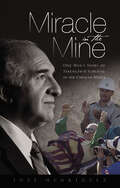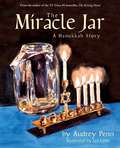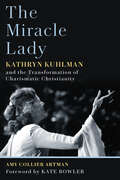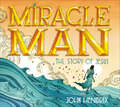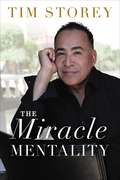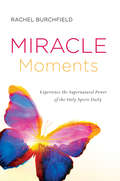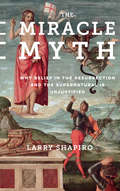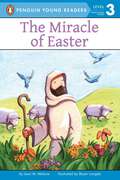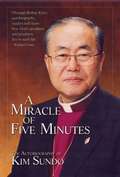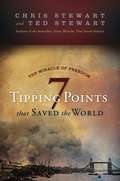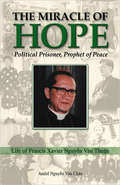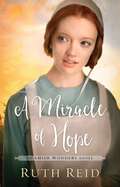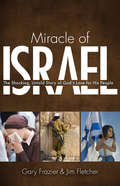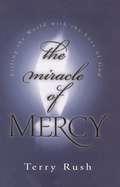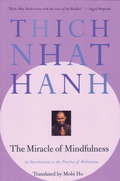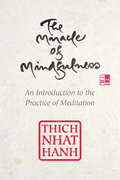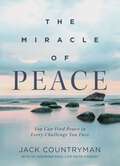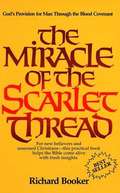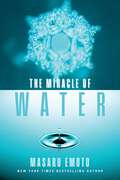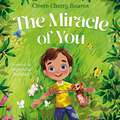- Table View
- List View
Miracle in the Mine: One Man's Story of Strength & Survival in the Chilean Mines
by José HenríquezOn October 13, 2010, millions of television viewers on five continents literally stopped everything to watch the amazing rescue of 33 men trapped underground in the mine of San José de Copiapó in northern Chile. What had seemed at first a hopeless tragedy later became a triumph of human effort, courage, perseverance, and expertise. For 17 excruciating days no one knew whether any of the miners had survived the collapse of the mine shaft, nor were the surviving miners aware of any rescue attempts. They spent a total of 69 days trapped underground. And it was there, in that frightening cavern, that one man took on the responsibility of encouraging the others and use the tragedy as an opportunity to share his faith. Miracle in the Mine is the story of José Henríquez. The testimony of a man who was no stranger to danger even before he found himself trapped 2,300 feet under the earth in the San José mine. A man who has unequivocally demonstrated his integrity, courage, and moral strength both before, during, and after the mining accident, and who is now using this experience to inspire the world.
The Miracle Jar: A Hanukkah Story
by Audrey Penn Lea LyonSophie and her brother are excited by the arrival of Hanukkah, and they happily clean the cottage and shine the Menorah as their gift to the family. But when their mother shares her worry that they do not have enough cooking oil to last the eight days of Hanukkah, Father tells them the story behind the holiday celebration and the miracle of the oil. Inspired by the story, the family creates their own Miracle Jar and watches the oil disappear as they enjoy the special food that each day brings. The family's hope and faith is confirmed when a last wipe with a cloth produces just enough oil to enjoy the eighth day's treat.In this heartwarming story told by bestselling author Audrey Penn, the flicker of the Menorah candles links past to present, and the miracle of the oil transcends the ages and reminds readers of the spirit of Hanukkah and the continuing possibility of miracles.
The Miracle Lady: Kathryn Kuhlman and the Transformation of Charismatic Christianity
by Amy Collier ArtmanA smart, powerful, charismatic preacher brought back to lifeOn October 15, 1974, Johnny Carson welcomed his next guest on The Tonight Show with these words: “I imagine there are very few people who are not aware of Kathryn Kuhlman. She probably, along with Billy Graham, is one of the best-known ministers or preachers in the country.” But while many people today recognize Billy Graham, not many remember Kathryn Kuhlman (1907–1976), who preached faith and miracles to countless people over the fifty-five years of her ministry and became one of the most important figures in the rise of charismatic Christianity.In The Miracle Lady Amy Collier Artman tells the story of Kuhlman’s life and, in the process, relates the larger story of charismatic Christianity, particularly how it moved from the fringes of American society to the mainstream. Tracing her remarkable career as a media-savvy preacher and fleshing out her unconventional character, Artman also shows how Kuhlman skillfully navigated the oppressive structures, rules, and landmines that surrounded female religious leaders in her conservative circles.
Miracle Man: The Story of Jesus
by John HendrixIn this moving interpretation of the life and ministry of Jesus, John Hendrix brings to life the Biblical accounts of Jesus’s miracles, crucifixion, and resurrection. From the feeding of the five thousand to walking on water, this is a story of faith told through Jesus’s miraculous deeds. The story of the Miracle Man is one of the best known in human history, and it has been retold by countless writers and artists for more than two thousand years. In this handsome edition, Hendrix brings his signature style—interweaving hand-lettering with original illustrations—to create a sophisticated approach that readers of all Christian denominations will find both extraordinary and inspirational.
The Miracle Mentality: Tap into the Source of Magical Transformation in Your Life
by Tim StoreyDuring challenging times, toxic thoughts can drag you into a mindset that&’s mundane, messy, and mad. Negative thinking can undermine all aspects of your life, from family and romantic relationships to career satisfaction, financial stability, and physical and spiritual health. To overcome these obstacles, you need a new mindset--a miracle mentality--where dreams are achievable, hope is actionable, and spiritual healing is possible.In the Miracle Mentality, life coach, speaker, and author Tim Storey provides you with a road map to transcend negative thinking, leading you to bigger adventures, more opportunities, and deeper meaning.Experience a miracle mentality transformation with…Tim&’s honest and powerful testament that will strengthen your perspective, positivity, and personal choiceEssential coaching that will help you navigate friendships and romantic relationshipsTips on establishing a fulfilling work-life balanceAn encouraging and practical approach to physical, mental, and spiritual healthThe discovery of a new mindset and freedom that can be applied to your personal financesHonest talk about the influential role of a parent and information to help you improve your parenting skillsBonus features include:Chapter Summaries, to provide a quick reference of each topic&’s key pointsThe Miracle Mentality Total Mindset Assessment, to gauge whether you&’re living in the mundane, messy, or mad in six areas of your life (parenting, love relationships, friendships, work/career, money, and health)Miracle Mentality Workbook, to help you apply what you&’ve learned and brainstorm ways to infuse all areas of your life with a Miracle MentalityPraise for The Miracle Mentality:&“The quality of your life is determined by the quality of your mindset! Tim Storey has been helping people transform their lives for decades and his timeless wisdom in this book will support you in turning any setback into your biggest comeback!&” -- Lewis Howes, New York Times bestselling author, entrepreneur, and host of The School of Greatness podcast&“You are incredibly powerful. And that&’s the good news and the bad news. You can make anything happen with the right thinking--and you also can make a lot of bad stuff happen to you with the wrong thinking. Mindset and how you approach life, business, and problems determines the outcome and conditions of your life. You can do anything with the right mindset.&” -- Grant Cardone, bestselling author, renowned speaker, social media influencer, and real estate mogul&“I have known Tim Storey for quite some time now, and his dedication to spirituality and mental health are unparalleled. The Miracle Mentality is just that. In his new book, Tim captures the essence of what a miracle really looks like, and it only made me believe in them more.&” -- Dylan McDermott, Golden Globe Award winning actor&“The quality of our lives is directly correlated to the quality of our thoughts. My friend Tim Storey understands miraculous thinking better than anyone I know.&” -- Ed Mylett, speaker, podcaster, and one of the fastest-growing business personalities in the history of social media&“Mindset: pay attention to what you are paying attention to. Your mindset is everything when it comes to championship--champion living, champion giving, champion choices, and champion impact.&” -- Gloria Mayfield Banks, author, entrepreneur, international speaker, and #1 Elite Executive National Sales Director for Mary Kay, Inc.
Miracle Moments: Experience the Supernatural Power of the Holy Spirit Daily
by Rachel BurchfieldA practical guide to listening to the whispers, warnings, power, and presence of the Holy Spirit--and expecting the miraculous every day. Compiled over thirty years, this book is a manual for miracle living. Integrated throughout each of the twelve chapters are the author’s personal memoirs of God’s faithfulness to build Discovery Camp and introduce half-a-million campers to the love of Jesus Christ. The message that repeats throughout Miracle Moments is that serving Jesus is an adventure when you depend totally on the Holy Spirit. As we honor Him, uncommon miracles become commonplace, as documented in this twenty-five year narrative. God does not tease us. He who releases dreams into our hearts never sleeps nor slumbers. Behind every God-given dream, whether it’s for our children, marriage, business, or ministry, stands God’s sterling character and all the resources of heaven. As readers learn twelve important life lessons, they will regain confidence in a faithful God and receive courage to hold on to their personal dreams and expect miracle moments of their own.
The Miracle Myth: Why Belief in the Resurrection and the Supernatural Is Unjustified
by Larry ShapiroThere are many who believe Moses parted the Red Sea and Jesus came back from the dead. Others are certain that exorcisms occur, ghosts haunt attics, and the blessed can cure the terminally ill. Though extraordinarily improbable, people have embraced miracles and myths for millennia, seeing in them proof of the extraordinary potential of our world-and ourselves.Helping us think more critically about our belief in the improbable, The Miracle Myth breaks down our mythmaking strategies to better understand how attempts to justify belief in the supernatural fall short. Through arguments and accessible analysis, Larry Shapiro sharpens our critical faculties so we become less susceptible to tales of myths and miracles and learn how, ultimately, our belief in them is counterproductive. Shapiro acknowledges that myths have value. They may even provide insight into our place in nature. Even so, if our understanding of reality is formed through the fallacy of myth, our ties to the world fray. Shapiro's investigation reminds us of the importance of evidence and rational thinking as we explore the unknown.
The Miracle Myth: Why Belief in the Resurrection and the Supernatural Is Unjustified
by Lawrence ShapiroThere are many who believe Moses parted the Red Sea and Jesus came back from the dead. Others are certain that exorcisms occur, ghosts haunt attics, and the blessed can cure the terminally ill. Though miracles are immensely improbable, people have embraced them for millennia, seeing in them proof of a supernatural world that resists scientific explanation.Helping us to think more critically about our belief in the improbable, The Miracle Myth casts a skeptical eye on attempts to justify belief in the supernatural, laying bare the fallacies that such attempts commit. Through arguments and accessible analysis, Larry Shapiro sharpens our critical faculties so we become less susceptible to tales of myths and miracles and learn how, ultimately, to evaluate claims regarding vastly improbable events on our own. Shapiro acknowledges that belief in miracles could be harmless, but cautions against allowing such beliefs to guide how we live our lives. His investigation reminds us of the importance of evidence and rational thinking as we explore the unknown.
The Miracle of Easter (Penguin Young Readers, Level 3)
by Jean M. MaloneThis easy-to-read book with gentle illustrations tells the well-known Bible story of Easter. It's a perfect story for children who are learning about their religion and starting to read on their own.
The Miracle of Father Kapaun: Priest, Soldier, and Korean War Hero
by Roy Wenzl Travis HeyingFather Emil Kapaun is a figure whose heroism during the Korean War still serves as a lamp to guide our feet on the path of life. Under the unbelievably brutal conditions of a prisoner of war camp, survivors say, no matter their religion Father Kapaun did more to save lives and maintain morale than any other man they know. In tracking down the story of Father Kapaun for the Wichita Eagle, Wenzl and Heying uncovered a paradox. What truly constitutes sainthood? Do we have it within ourselves? Father Kapaun was posthumously awarded the United States' highest military recognition, the Medal of Honor. The citation for it reads, in part, "Chaplain Emil J. Kapaun repeatedly risked his own life to save the lives of hundreds of fellow Americans. His extraordinary courage, faith and leadership inspired thousands of prisoners to survive hellish conditions, resist enemy indoctrination, and retain their faith in God and country."
A Miracle of Five Minutes: The Autobiography of Kim Sundo
by AbingdonIn 1930, Sundo Kim was born at Sunchun, Pyunganbukdo, North Korea. Standing at the crossroads of life and death, he experienced the living God numerous times and decided to become a pastor. In 1970, he was appointed as pastor toKwanglim Methodist Church in Seoul, Korea. Through the ministries of a positive application of the word of a new vision of life, spiritual healing, systematic and creative church administration, and special missions, he invited many souls to God and gave Christians new spiritual energy. as a member of Board of Trustees of Asbury Seminary.
The Miracle Of Forgiveness
by Spencer W. KimballSince it was first published in 1969, The Miracle of Forgiveness has changed countless lives for good. Deseret Book is proud to release the 35th Anniversary edition of this classic doctrinal work. During his earthly ministry, Jesus performed many miracles, including healing numerous diseased and disabled bodies. But perhaps his greatest miracle was the healing of people's souls-the forgiveness of sin. Jesus offers us that same miracle on the same terms-sincere repentance. In The Miracle of Forgiveness, President Spencer W. Kimball gives a penetrating explanation of repentance and forgiveness and clarifies their implications for Church members. His in-depth approach shows that the need for forgiveness is universal; portrays the various facets of repentance; and emphasizes some of the more serious errors, particularly sexual ones, which afflict both modern society and Church members. Most important, he illuminates his message with the brightness of hope that even those who have gone grievously astray may find the way back to peace and security.+ Never before has any book brought this vital and moving subject into so sharp a focus. This classic book is a major work of substance and power. After all, who does not need the miracle of forgiveness?
The Miracle of Freedom: Seven Tipping Points That Saved the World
by Chris Stewart Ted T. Stewart"How unusual is it, really, in the history of all known human experience, to enjoy the blessing of living free?" The answer may surprise you. In The Miracle of Freedom, Chris and Ted Stewart make a strong case that fewer than 5 percent of all people who have ever lived on the earth have lived under conditions that we could consider "free." So where did freedom come from, and how are we fortunate enough to experience it in our day? "A deeper look at the human record," write the authors, "reveals a series of critical events, obvious forks in the road leading to very different outcomes, that resulted in this extraordinary period in which we live." They identify and discuss seven decisive tipping points: 1. The defeat of the Assyrians in their quest to destroy the kingdom of Judah. 2. The victory of the Greeks over the Persians at Thermopylae and Salamis. 3. Roman Emperor Constantine's conversion to Christianity. 4. The defeat of the armies of Islam at Poitiers. 5. The failure of the Mongols in their effort to conquer Europe. 6. The discovery of the New World. 7. The Battle of Britain in World War II. The journey to freedom has been thousands of years long. Now that it has found its place in the world, the question for those of us who experience its benefits is simply this: Will we work to preserve the miracle of freedom that we enjoy today?
The Miracle of Hope
by Van Chau Andre NguyenWritten by a friend of Cardinal Van Thuan, this biography chronicles the life of the man Pope John Paul II said was "...marked by a heroic configuration with Christ on the cross."
A Miracle of Hope (The Amish Wonders Series #3)
by Ruth ReidShe's heard about forgiveness all her life, but how far does God's mercy truly reach? Lindie Wyse thinks an arranged marriage is the only way to preserve a future for herself and her unborn child. Josiah Plank is certain he'll never love again, but he needs someone to care for his deaf eight-year-old daughter, Hannah. The two take on their arrangement tentatively at first but soon realize they are each in for more than they imagined. After a short time, Lindie experiences a breakthrough with Hannah when she recognizes the child's special gifts, but a risky pregnancy and serious health issues threaten to demolish the foundation Josiah and Lindie are building--and the love that is growing between them. Will their marriage survive their struggles, or will their hearts become as cold as the northern winter?
Miracle of Israel: The Shocking, Untold Story of God's Love For His People
by Jim Fletcher Gary FrazierEveryone is looking for a miracle. Families devastated by a faltering economy. A college student facing the horrific diagnosis of cancer. Corporately, whole nations are teetering on the brink of despair and chaos. The Miracle of Israel is a stunning examination of the millennia-old love that God has for His people that: Clearly conveys the promise God gave to Abraham Examines the ancient prophecies regarding Israel that have happened and are unfolding even today Provides an easy-to-read timeline of miracle after miracle related to the nation of Israel Tracing the history of the Jewish people to the present day, the authors look at prophecy after prophecy that clearly attest to the Lord's miraculous promises. From historical records to personal, dramatic stories, the Miracle of Israel shows us that in keeping epic promises to the nation of Israel, God's provision for each of us is sure, perfect, and on time, every time.
The Miracle of Mercy: Filling The World With The Love of God
by Terry RushIf you think it will take a miracle to fill the world with the love of God, you're right, according to popular author Terry Rush -- it will take the miracle of mercy.
The Miracle of Mindfulness: A Manual On Meditation
by Thich Nhat HanhIn this beautiful and lucid guide, Zen master Thich Nhat Hanh offers gentle anecdotes and practical exercise as a means of learning the skills of mindfulness--being awake and fully aware. From washing the dishes to answering the phone to peeling an orange, he reminds us that each moment holds within it an opportunity to work toward greater self-understanding and peacefulness.
The Miracle of Mindfulness, Gift Edition
by Thich Nhat HanhA new gift edition of the classic guide to meditation and mindfulness, featuring archival photography and beautiful calligraphy by Thich Nhat HanhSince its publication in 1975, The Miracle of Mindfulness has been cherished by generations of readers for its eloquent and useful introduction to the practice of meditation. Readers interested in an introduction to Buddhist thought, as well as those seeking to learn about mindfulness and stress reduction, continue to look to Thich Nhat Hanh's classic work for guidance and inspiration. This new hardcover gift edition features elegant calligraphic illustrations by Thich Nhat Hanh, as well as a dozen photographs spanning his early days as a peace activist to his life in Plum Village, a spiritual community that he founded in France. Also included in this edition is a historical chronology of Thich Nhat Hanh's life and work, and a revised afterword by Jim Forest.
Miracle of Miracles
by Mina NevisaThe story of Mina's conversion from Islam to Christianity. A must-read for anyone who wants to reach out to Muslims, or better understand their faith.
The Miracle of Peace: You Can Find Peace in Every Challenge You Face
by Jack CountrymanGod has instructed us in the Bible not to worry about tomorrow. It sounds simple, so why is it so difficult to achieve? Why can't we find peace? Explore what the Bible says about letting go of anxiety and fear and embracing a new way of thinking that brings us into a closer relationship with God.Trusted author Jack Countryman and other dynamic people of faith from their thirties to their nineties will share inspiration and hope about the miraculous peace that only God can bring about during the stormiest seasons in life. You'll be encouraged as you discover how to:Understand God's plans when nothing seems to make senseFind calm when all around you is chaosTrust that God has you in the palm of His hand This beautiful book includes:A presentation page for gift-givingA ribbon marker to keep your place52 meditations about finding peace in a troubled world God doesn't want His loved ones to suffer with worry. As you draw closer to Him, you'll experience the miracle of peace that is available to you. You only need ask.
Miracle of the Bells
by Russell JanneySet mostly in the hard coal region of Pennsylvania, this post-ww2 novel centers around Bill Dunnigan, fast-talking, clever press agent. In trying to help a small-town girl become an actress, he has to take a trip to her Pennsylvania home where he finds a religious awakening for not only himself, but everyone he draws in. A remarkable story with great characterization.
The Miracle of the Scarlet Thread
by Richard BookerThe author explains the blood covenant from its beginnings in the Old Testament through Chist's crucifixion in the New Testament.
The Miracle of Water
by Masaru EmotoThis thoughtful book includes new and extraordinary water-crystal photographs that provide convincing reasons for all of us to choose positive words and strive for perfect resonance for a more healthy, peaceful, and happy life. Masaru Emoto has photographed thousands of water crystals throughout his years of research, yet few have been as beautiful and life affirming as those formed from the words &“love and gratitude.&” In The Miracle of Water, Dr. Emoto demonstrates how water&’s unique role in transporting the natural vibration of these words can help you welcome change and live a more positive and happy life. When we speak positive words, we send out a special vibration to others. They in turn emit positive words and, as a result, we are touched by the energy of love and gratitude. Words expressed in kindness and compassion are certain to result in positive effects for the giver. As Emoto says: 'If you shine a light on those around you with the words you use, you won't ever have to walk in the dark again.' This reflective, contemplative book explores water's critical role in transporting 'vibration information' to the body, and what we can learn from water crystals. There are compelling insights on using the lessons of resonance to mend disharmonious relationships, restore health and bring positive energy into your life.
The Miracle of You
by Cleere Cherry ReavesA lyrical picture book from Cleere Cherry Reaves of the popular brand Cleerely Stated, The Miracle of You celebrates the unconditional love of a parent and the uniqueness of your child among all the beauty of God's creation.From the creatures that swim deep in the sea to the galaxies that reach far and wide, the world is filled with the color and creativity of God. Yet nothing compares to experiencing His miraculous design like the gift of the child He has given you.When Cleere Cherry Reaves's son was born three months prematurely, Cleere and her husband watched as their child--their miracle--fought for his life, developed, and began to thrive. In The Miracle of You, Cleere's poetic words speak for every parent and grandparent in awe at the God-given miracle of their little ones.This read-aloud book for boys and girls ages 4 to 8pairs heartwarming rhymes with whimsical artwork;teaches children that Jesus is the giver of miracles;is a perfect gift for a baby shower, baptism, baby dedication, child's birthday, or Mother's Day;serves as a stunning decorative piece in nurseries and children's bedrooms; andbuilds a healthy self-esteem in kids, focusing on who they are, not what they do.A love letter to the child of your heart, The Miracle of You reminds children that they are more marvelous than anything else God created and loved beyond anything they could ever imagine.
